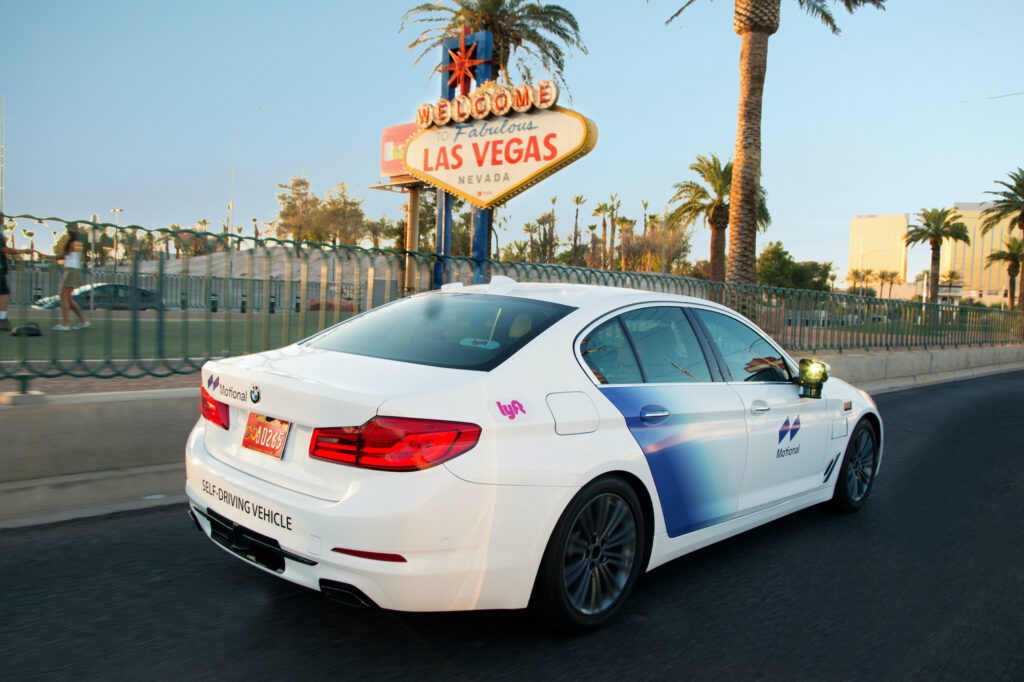Motional has confirmed it has begun operating driverless vehicles on public roads, becoming one of the world’s first companies to do so.
The vehicles are part of an inaugural test program being held in Las Vegas this month, consisting of multiple self-driving cars safely navigating intersections, unprotected turns and interactions with other road users, including pedestrians and cyclists.
The company says its driverless operation follows decades of innovation, 1.5 million miles, and a two-year self-imposed safety evaluation process that took hundreds of employees more than 100,000 hours to complete.
Before unleashing its vehicles on Las Vegas’s public streets, Motional gave TÜV SÜD – a world-leading independent technical service provider with extensive experience assessing driverless technology – access to the company’s proprietary systems, technology and operations, to evaluate their safety.
Upon completion of its assessment, TÜV SÜD provided Motional with a first-of-its-kind endorsement to operate with an empty driver’s seat. The state of Nevada granted Motional permission to do so last November.
Motional already has partnerships with two ridesharing leaders – Lyft and Via – which will see Motional deliver state-of-the-art, next-generation robotaxis based on a Hyundai vehicle platform, integrated with sensors, computers and software to enable fully driverless operation and remote vehicle assistance.
In 2023, Motional and Lyft will launch a scalable, fully driverless, multi-market service — the largest agreement of its kind for a major ridesharing network. Lyft and Motional already operate the world’s longest-standing commercial robotaxi service, and have provided more than 100,000 rides with zero at-fault incidents.
“Not all driverless systems are created equal,” commented Karl Iagnemma, president and CEO, Motional. “Ours is the product of decades of innovation, a relentless commitment to safety and process, more than a million miles of testing, and a rigorous external review. We’re one of the first companies in the world to go driverless. It’s a significant step on our path to making driverless vehicles a safe, reliable and accessible reality, and a proud day for Motional.”
Safety review
During its 18-month review of Motional’s systems, TÜV SÜD’s experts interviewed employees, reviewed detailed safety architecture designs, analyzed testing processes and results, scrutinized training procedures, and reviewed the qualifications and skill of the team.
The resulting first-of-its-kind endorsement is a testament to the soundness of Motional’s technology, according to the company. It supports Motional’s driverless testing in its operational design domain, with a safety steward in the passenger seat. Safety stewards monitor the route, and have the ability to stop the vehicle. They have not had to do so during Motional’s driverless operations.
This external review was just one part of Motional’s industry-leading safety evaluation process, which the company detailed in its Voluntary Safety Self-Assessment (VSSA).
Throughout the process, Motional covered enough distance to circumnavigate the world multiple times. This testing was in addition to the 1.5 million miles Motional had already driven across a diverse set of road environments, cities, and vehicle platforms.
Testing took place on public roads with a safety operator, as well as on closed courses with and without a safety operator.
As part of the testing, Motional says its vehicles navigated thousands of challenging scenarios, including: human-driven cars and other autonomous vehicles; pedestrians, cyclists and other road actors; busy intersections and unprotected turns; a wide range of traffic and road conditions; and safely-staged edge cases on closed courses.
Motional is a joint venture between Hyundai Motor Group and Aptiv, formerly Delphi Automotive PLC, a global technology company that designs and manufactures vehicle components, and provides electrical and electronic and active safety technology solutions to the global automotive and commercial vehicle markets.


